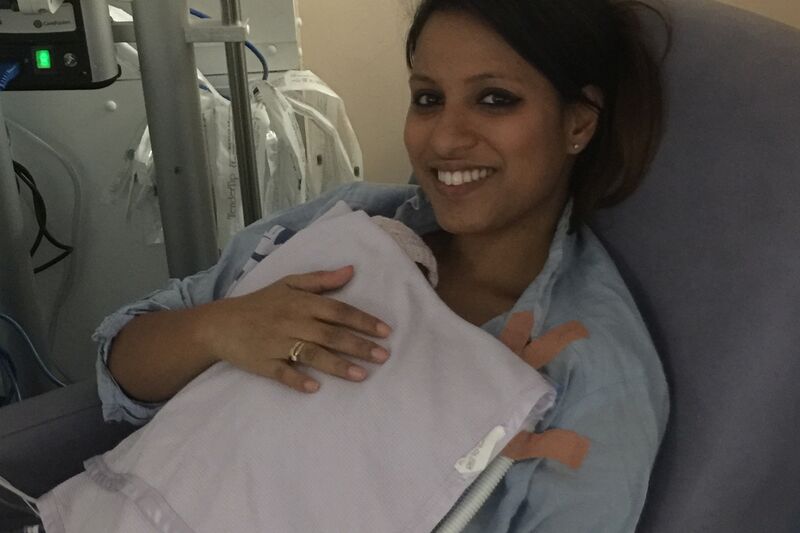Our little Ria was born on 9 September 2015, in Leeds General Infirmary weighing 1lb 3oz. I had gone into hospital 3cms dilated two weeks earlier but with an emergency stitch I managed to keep her in until I was 23 weeks pregnant.
I went into full labour and she was delivered 12 hours later. I had septicaemia so the birth was a bit of a blur. My placenta was stuck and was only removed seven hours later. During this time Rishi stayed by my side. I wasn't able to see Ria for two and a half days after she was born because the doctor’s thought I had Clostridium difficile (C. diff) (a serious bacterial infection).
I was worried I wouldn’t see Ria alive and it was absolutely heart-breaking.
Whilst I was in isolation, Rishi spent a lot of time with Ria, even though he was torn between the two of us. But I didn't want Ria to be on her own. If she wasn't going to make it, I didn't want her to be with strangers.
She was in hospital for three months and three weeks (103 days), but came home 11 days before her due date.
That's almost unheard of for a baby born so premature. Our little one is quite feisty though, and she was out to prove everyone wrong.
I believe the other major factor to Ria doing so well was being part of the family integrated care (FIC) at St James's Hospital, Leeds. When she was transferred there, we couldn't stop smiling. We had heard about FIC and the autonomy it gave parents. You go from feeling like a spectator, not even being able to take her temperature, to 'just crack on'! It was fantastic. We finally felt like parents.
To be part of the FIC scheme at St James's you have to commit to be able to care for your baby for a minimum of six hours a day. We spent about 14 hours at the hospital each day so we qualified to be part of the scheme. We were probably the doctors’ and nurses’ worst nightmare, they used to force us to go home.
If we had the energy, it was going to be spent with Ria. I always thought that if she hadn't been born so early she'd have been in my belly, hearing my voice. So I wanted her to hear my voice as much as possible whilst in hospital.
It has been shown that babies do better with FIC, and that's partly because of the consistency of care they receive. Plus the fact, you're always going to be extra careful with your own baby. Before we got into the FIC system, I would watch someone take her temperature, change her position, probes or nappy and think “I wish I could do those things for her”.
Family integrated care meant we made up all her feeds and drew up her meds to give them to her ourselves. We changed her nappy when we wanted to, changed her outfits, changed her nasal gastric (NG) tube and nasal prongs, but the best part was picking her up for a cuddle whenever we wanted.
